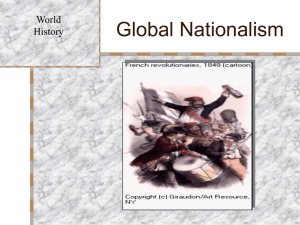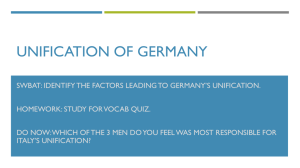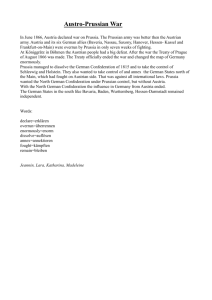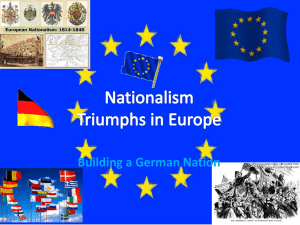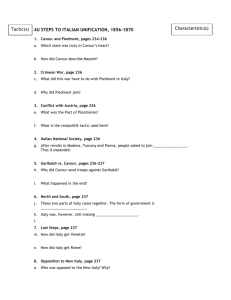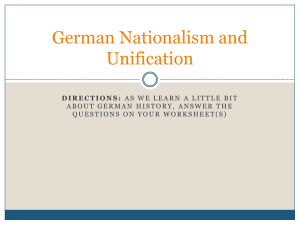Chapter 22 Notes Part 2
advertisement
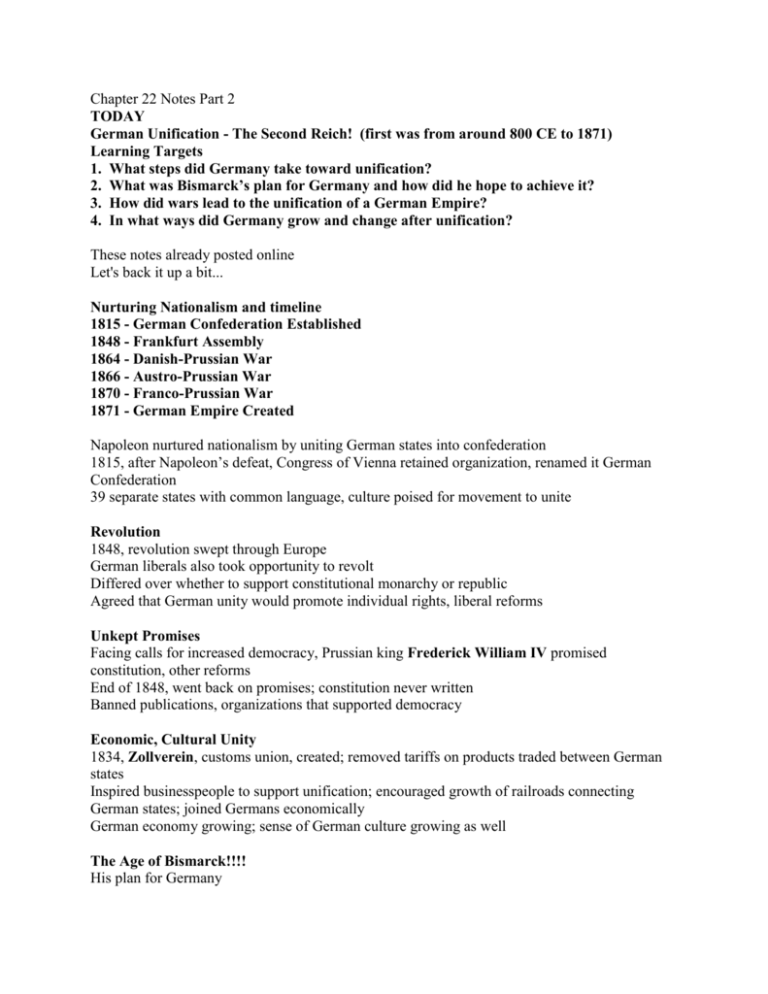
Chapter 22 Notes Part 2 TODAY German Unification - The Second Reich! (first was from around 800 CE to 1871) Learning Targets 1. What steps did Germany take toward unification? 2. What was Bismarck’s plan for Germany and how did he hope to achieve it? 3. How did wars lead to the unification of a German Empire? 4. In what ways did Germany grow and change after unification? These notes already posted online Let's back it up a bit... Nurturing Nationalism and timeline 1815 - German Confederation Established 1848 - Frankfurt Assembly 1864 - Danish-Prussian War 1866 - Austro-Prussian War 1870 - Franco-Prussian War 1871 - German Empire Created Napoleon nurtured nationalism by uniting German states into confederation 1815, after Napoleon’s defeat, Congress of Vienna retained organization, renamed it German Confederation 39 separate states with common language, culture poised for movement to unite Revolution 1848, revolution swept through Europe German liberals also took opportunity to revolt Differed over whether to support constitutional monarchy or republic Agreed that German unity would promote individual rights, liberal reforms Unkept Promises Facing calls for increased democracy, Prussian king Frederick William IV promised constitution, other reforms End of 1848, went back on promises; constitution never written Banned publications, organizations that supported democracy Economic, Cultural Unity 1834, Zollverein, customs union, created; removed tariffs on products traded between German states Inspired businesspeople to support unification; encouraged growth of railroads connecting German states; joined Germans economically German economy growing; sense of German culture growing as well The Age of Bismarck!!!! His plan for Germany Conservative poltician Became prominent in Prussain politics 1847, gave strongly conservative speech at National Assembly 1862, new Prussain King William I (1861-1888)chooses Bismarck as his Prime minister Bismarck's Philosophy Not liberal like revolutionaires in 1848 Supports Monarchy or King system of government Believed Prussia destined to lead German people to unification Practiced "Realpolitik", policies based upon interests of Prussia (Similar to Politique!) Power rather than ideals.......Machiavelli? Blood and Iron Politics of reality evident in push to increase Prussian military power Speech to Parliament: German unity not won by speeches or majority vote, but by "blood and iron" Built Prussian military into great war machine His First War Disagreement over two border states—Schleswig, Holstein— gave Bismarck opportunity to begin war with Denmark 1864, formed military alliance with Austria against Denmark Believed both Schleswig, Holstein should be controlled by German Confederation Results Denmark loses badly, gives territory to Austria and Denmark Prussian controlled Schleswig and Austria Holstein Austria now holds territory inside Prussia Bismarck knew to unite Germany, war with Austria inevitable Unification and Empire He needed Austria out of the way Preparations Bismarck worked "back channels" Promised Venetia to Italy in exchange for support Persuaded Napoleon III to keep France neutral Provocation Sent Prussian troops into Holstein Austria declares war Prussian support the war effort Nationalism King William I blames Austria, people buy into the strength of the German state Austro-Prussian War 7 weeks to destroy Austria...........easy......and Austria gives up Holstein Many north German states unite with Prussia (see the writing on the wall?) Only three southern states remain outside Prussian control - need to push another state to concede this (France on the table as possible country to take on) Franco Prussian War 1870 - conflict over disputed Alsace and Lorraine territory on the German/French border, had been part of Holy Roman Empire, which included Prussia Nationalism again used to help push more support in the south These southern states support war with France By 1871, France defeated, peace treaty declared Germany unified Creating German Empire Victory established unified empire Representatives meet in Versailles Proclaimed Wilhelm I first kaiser or emperor of German empire Wilhelm appointed Bismarck first chancellor German victory changed balance of power in Europe Napoleon III gone, France no longer as powerful As Germany economy grows, so does their power and influence German Empire grows and changes A new government Germany's 25 separate states wanted to retain power Federalist system instituted, political parties developed Bismarck strong opponent of Catholic Church Government should control aspects of culture, like education, not the Church Worked to restrict Catholic influence in Germany (Kulturkampf), appeases the LIBERALS in Germany!!!!! Economic Growth Railroads After unification, Germany experienced time of economic growth France had paid reparations, Germany uses money to build railroads to link German states Industrial Growth Other funds help build German businesses New empire began to catch up with England and France Coal mines, steel factories flourished in Germany's major cities Path to Social Reforms Industrialization had its critics....similar to England Socialists protested working conditions, wanted state to control all of the industries Legislation - Bismarck tries to destroy socialism without destroying socialism Blamed socialists for two assassination attempts on the Emperor Sought to reduce appeal of socialism by enacting own reforms 1880s - pushed through legislation providing benefits for: Health Accidents Old Age Disability After Unification Bismarck was NOT internationalist....didn't see the need to increase size of Prussia Did think France was a threat though Alliances created with Austria-Hungary, Italy, and Russia Eventually Bismarck forced out by Kaiser William II
